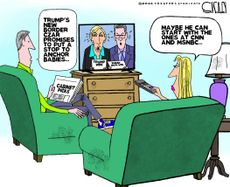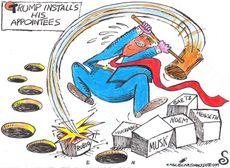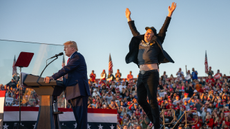When crisis powers become permanent
Will coronavirus permanently curtail civil liberties? Look at the Patriot Act.


Americans were little familiar with the Patriot Act when then-President George W. Bush signed it into law in October of 2001, less than two months after the 9/11 attacks. (Most members of Congress never read the bill, either.) But subsequent years made increasingly clear the extent of its civil liberties abuses, and Americans' opposition rose accordingly. For civil libertarians, the Patriot Act has become an archetypal example of state abuse of a crisis to grab new powers it will never voluntarily concede.
The law is once again up for congressional renewal, this time while a new crisis, the coronavirus pandemic, is raising fresh fears of "temporary" emergency measures becoming permanent. The history of the Patriot Act is a window into why those fears are justified — and defensible without downplaying the risk of COVID-19 or dismissing the value of a robust public health response.
Much like support for COVID-19 mitigation measures now, the Patriot Act was largely popular when it was newly made law. The bill passed the House in a 357-66 vote and the Senate with only a single dissent (Wisconsin Democrat Russ Feingold). The Bush administration touted it on the Justice Department website as key to "a number of successful operations to protect innocent Americans from the deadly plans of terrorists dedicated to destroying America and our way of life." Its changes were "modest" and "incremental," the Bush DOJ claimed, simply a matter of taking "existing legal principles and retrofitt[ing] them to preserve the lives and liberty of the American people from the challenges posed by a global terrorist network."
Subscribe to The Week
Escape your echo chamber. Get the facts behind the news, plus analysis from multiple perspectives.

Sign up for The Week's Free Newsletters
From our morning news briefing to a weekly Good News Newsletter, get the best of The Week delivered directly to your inbox.
From our morning news briefing to a weekly Good News Newsletter, get the best of The Week delivered directly to your inbox.
These claims were lies. The DOJ revealed in 2015 that in 14 years, the mass surveillance capabilities authorized by Section 215 of the Patriot Act hadn't helped solve any major terrorism cases. Between 2003 and 2006, for example, the FBI used Patriot Act authority to issue 192,499 national security letters, which allowed the agency to collect targets' phone and computer records, as well as credit and banking history, without obtaining a warrant from a judge. (The letters predated the Patriot Act, but the law substantially expanded their use.) All those thousands of letters produced a sole terrorism conviction — and it could have been accomplished without a national security letter. One national security letter alone could acquire hundreds of Americans' data; that data could be shared with more than 30,000 law enforcement agencies; and, once collected, it would never be deleted.
The Bush administration's rhetoric around "sneak and peek" warrants, a Patriot Act provision which allowed law enforcement to execute search warrants without notifying the owner immediately, was especially deceptive. These "delayed notification search warrants have been used for decades, have proven crucial in drug and organized crime cases, and have been upheld by courts as fully constitutional," the DOJ site asserted. In reality, sneak and peek warrants were rare before the Patriot Act. They were difficult to obtain and could only be used in a few investigations, and the Supreme Court has not ruled on their constitutionality. In the Patriot Act's first decade, sneak and peek requests spiked, but fewer than 1 percent involved terrorism. Like many Patriot Act provisions, delayed notice warrants have proven handy for the drug war instead, and the DEA has been caught trashing a target's home to make its sneak and peek look like a burglary.
These and other Patriot Act violations of Americans' rights have proven thoroughly resistant to meaningful reform — even after whistleblower Edward Snowden's 2013 revelation of the scale of federal mass surveillance. The congressional record has seen the occasional skirmish over the law's reauthorizations. Yet even 2015's USA Freedom Act, which was touted as a fix for Patriot Act-authorized bulk data collection, changed little in its final version. Presidents Bush, Obama, and Trump all signed Patriot Act renewals, though as a senator Obama condemned the law and Trump self-servingly complains of surveillance of his 2016 campaign.
Now another reauthorization vote is underway. The changes made in this "Febreze reform bill," in the phrase of Cato Institute civil liberties scholar Julian Sanchez, are either functionally meaningless or accord special privileges to politicians not afforded to the rest of us.
Worse yet, an amendment from Senate Majority Leader Mitch McConnell (R-Ky.) would "expressly permit the FBI to warrantlessly collect records on Americans' web browsing and search histories," The Daily Beast reports. "In other words, this amendment would permit the FBI to turn to your internet provider and demand they fork over your browser history" without supplying a warrant as the 4th Amendment prescribes, Reason confirms. In all likelihood, the final reauthorization vote will expand federal spying power more than curtail it, and it will do so with broad bipartisan support.
So what of coronavirus policies? Will measures like limits on group assembly or evening curfews also evade repeal or reform? Will they become a permanent new part of American society? Polling has repeatedly showed most Americans support aggressive, even invasive measures to control COVID-19's spread and curb its death toll — and polling also shows most Americans are afraid their civil liberties will be a victim of the pandemic response. In fact, more are worried about losing freedoms than about losing a job.
That fear isn't unreasonable (though, mercifully, history suggests some cause for optimism). Our governments' response to this pandemic has varied widely across the country, often mixing prudence with overreach, wisdom with gross lust for power. And some policies that are prudent now will become overreach in a week's, month's, or year's time. All told, we are right to be defensive of our civil liberties. This latest Patriot Act vote should remind us how difficult they are to reclaim.
Want more essential commentary and analysis like this delivered straight to your inbox? Sign up for The Week's "Today's best articles" newsletter here.
Sign up for Today's Best Articles in your inbox
A free daily email with the biggest news stories of the day – and the best features from TheWeek.com
Bonnie Kristian was a deputy editor and acting editor-in-chief of TheWeek.com. She is a columnist at Christianity Today and author of Untrustworthy: The Knowledge Crisis Breaking Our Brains, Polluting Our Politics, and Corrupting Christian Community (forthcoming 2022) and A Flexible Faith: Rethinking What It Means to Follow Jesus Today (2018). Her writing has also appeared at Time Magazine, CNN, USA Today, Newsweek, the Los Angeles Times, and The American Conservative, among other outlets.
-
 Today's political cartoons - November 16, 2024
Today's political cartoons - November 16, 2024Cartoons Saturday's cartoons - tears of the trade, monkeyshines, and more
By The Week US Published
-
 5 wild card cartoons about Trump's cabinet picks
5 wild card cartoons about Trump's cabinet picksCartoons Artists take on square pegs, very fine people, and more
By The Week US Published
-
 How will Elon Musk's alliance with Donald Trump pan out?
How will Elon Musk's alliance with Donald Trump pan out?The Explainer The billionaire's alliance with Donald Trump is causing concern across liberal America
By The Week UK Published
-
 US election: who the billionaires are backing
US election: who the billionaires are backingThe Explainer More have endorsed Kamala Harris than Donald Trump, but among the 'ultra-rich' the split is more even
By Harriet Marsden, The Week UK Published
-
 US election: where things stand with one week to go
US election: where things stand with one week to goThe Explainer Harris' lead in the polls has been narrowing in Trump's favour, but her campaign remains 'cautiously optimistic'
By Harriet Marsden, The Week UK Published
-
 Is Trump okay?
Is Trump okay?Today's Big Question Former president's mental fitness and alleged cognitive decline firmly back in the spotlight after 'bizarre' town hall event
By Harriet Marsden, The Week UK Published
-
 The life and times of Kamala Harris
The life and times of Kamala HarrisThe Explainer The vice-president is narrowly leading the race to become the next US president. How did she get to where she is now?
By The Week UK Published
-
 Will 'weirdly civil' VP debate move dial in US election?
Will 'weirdly civil' VP debate move dial in US election?Today's Big Question 'Diametrically opposed' candidates showed 'a lot of commonality' on some issues, but offered competing visions for America's future and democracy
By Harriet Marsden, The Week UK Published
-
 1 of 6 'Trump Train' drivers liable in Biden bus blockade
1 of 6 'Trump Train' drivers liable in Biden bus blockadeSpeed Read Only one of the accused was found liable in the case concerning the deliberate slowing of a 2020 Biden campaign bus
By Peter Weber, The Week US Published
-
 How could J.D. Vance impact the special relationship?
How could J.D. Vance impact the special relationship?Today's Big Question Trump's hawkish pick for VP said UK is the first 'truly Islamist country' with a nuclear weapon
By Harriet Marsden, The Week UK Published
-
 Biden, Trump urge calm after assassination attempt
Biden, Trump urge calm after assassination attemptSpeed Reads A 20-year-old gunman grazed Trump's ear and fatally shot a rally attendee on Saturday
By Peter Weber, The Week US Published